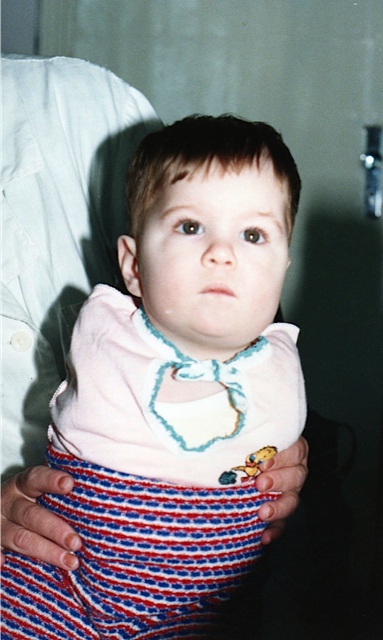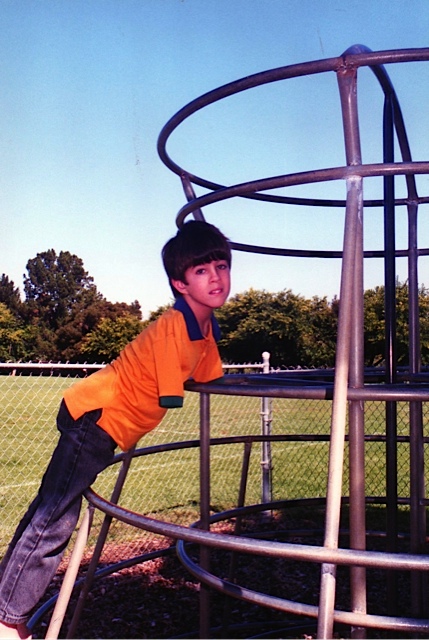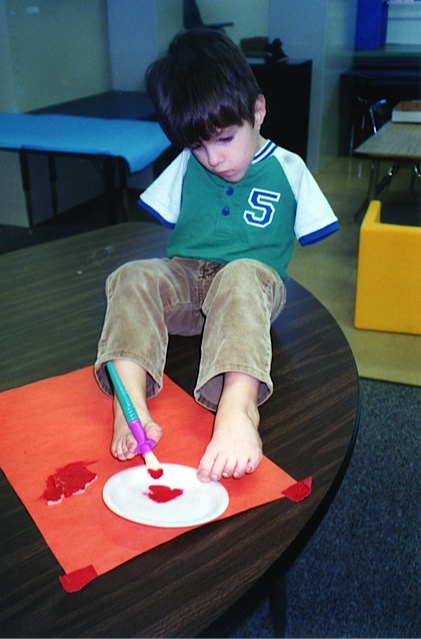For the past couple of weeks, families who have children with autism have been on pins and needles waiting for the outcome of a lawsuit filed by neighbors against a local family who have a son who is autistic.
As I read the articles and watched stories on the news about this lawsuit, many memories of years ago came to mind. In fact, things have changed so much I had almost forgotten many incidents. What I plan to share is my experience only. These are strictly my thoughts and opinions. Please do not generalize that all families who have a family member with autism go through what I went through with Kolya. If my readers have experiences to share, please make comments and share your stories for others to read.
 Kolya came from Siberia where he had lived in an orphanage from birth until he arrived in our home at the age of 18 months. We were told he was deaf and that was the primary reason he joined the family. He also is an upper congenital amputee and our family had previously adopted children who were amputees. I did not travel to Russia to bring him home and had never seen him until he came through the front door. Within ten minutes I knew he was not deaf. He responded only to mechanical sounds, like Derek’s suctioning machine, for example. Kolya could barely sit, had never eaten solid foods, and made no eye contact. In many ways I had no experience raising a child like Kolya and I learned quickly there were some gigantic mountains, not little hurdles, we had to climb.
Kolya came from Siberia where he had lived in an orphanage from birth until he arrived in our home at the age of 18 months. We were told he was deaf and that was the primary reason he joined the family. He also is an upper congenital amputee and our family had previously adopted children who were amputees. I did not travel to Russia to bring him home and had never seen him until he came through the front door. Within ten minutes I knew he was not deaf. He responded only to mechanical sounds, like Derek’s suctioning machine, for example. Kolya could barely sit, had never eaten solid foods, and made no eye contact. In many ways I had no experience raising a child like Kolya and I learned quickly there were some gigantic mountains, not little hurdles, we had to climb.
Kolya was not diagnosed as being autistic until he was five years old. He loved to be held and near people but continued to have little eye contact. He was aware of his environment and appeared to have a sixth or even seventh sense. He could follow verbal commands as he learned the English language. He had no spoken words or functional way to communicate. In fact, I was in denial that he was autistic because of some of the behaviors he displayed didn’t fit into the picture I had in my mind of a child with autism.
Running and climbing became ongoing problems for everyone involved with Kolya’s care and education. I remember the first time Kolya “ran away” and it was before he could even walk! I was in the living room feeding one of my other sons when I noticed cars stopped on the street in front of the house. I tried to see what was happening. Then I saw a lady walking up the driveway carrying Kolya. He had managed to open a sliding screen door and scoot on his behind down the long, concrete driveway, equivalent to five car lengths. He had ripped through his onesie and diaper. From that day on, others in his environment needed to be extra vigilant of the whereabouts of Kolya.
Kolya would escape as soon as someone would turn his or her back on him. Once he  learned to walk, he could run for miles and always in his bare feet because he wouldn’t wear shoes. He reminded me of a deer being free to jump fences or run across highways without being hit. I honestly don’t know how he survived some of his adventures. He had no fears, other than water running in the sink or bathtub.
learned to walk, he could run for miles and always in his bare feet because he wouldn’t wear shoes. He reminded me of a deer being free to jump fences or run across highways without being hit. I honestly don’t know how he survived some of his adventures. He had no fears, other than water running in the sink or bathtub.
I could give you many, many stories of his escapes but I’ll reflect on a few (let me know if you want to hear more). He was in a special classroom with one-to-one staff and one day he was in the play area and his staff person turned around to talk with someone. Sure enough, Kolya took advantage of the opportunity to climb a fence and explore the neighborhood. He found a screen door open that allowed him to enter the kitchen of a house. Can you imagine the shock the lady must have felt when she entered her kitchen and saw this little five-year-old standing there in shorts, T-shirt, no shoes and no arms? She asked him his name and of course he couldn’t answer verbally. She asked him several times and finally Kolya noticed a paper and pencil on the counter. He knocked the paper and pencil from the counter to the floor with his chin. Then  he plopped himself down on the floor, held the paper in place with his left foot and the pencil with his right foot, and wrote his name. By this time the school had called 911 and the woman also called 911 and the connection was made the calls were about the same child. He was returned to his school safe and sound.
he plopped himself down on the floor, held the paper in place with his left foot and the pencil with his right foot, and wrote his name. By this time the school had called 911 and the woman also called 911 and the connection was made the calls were about the same child. He was returned to his school safe and sound.
Another school experience was when his speech teacher needed to take a phone call and left him in the room unsupervised. When she came back he was gone. As she stood in the doorway of the classroom trying to locate him, she heard something coming from the ceiling. She looked up and noticed a couple of ceiling tiles were moved. Kolya had climbed some bookshelves and climbed into the ceiling space with all the insulation and wiring for lighting. How? This child has no arms. I’ll ask you only to imagine and please, please don’t ask him for a demonstration.
At home we were constantly challenged with knowing his whereabouts. He could take off like lightning when he sensed someone was not being attentive. He managed to climb a neighbor’s 40 ft redwood tree (remember he has no arms, not even stumps). He’d run into the hills and jump on house roofs. One day he found his way into a neighbor’s back yard and played in the mud while the sheriff’s department spent more than two hours trying to locate him. Finally the owner of the house looked out her kitchen window, realized the movement she saw was Kolya, and brought him back home. Even at his school for autistic children with one-on-one staff he managed to take off on a specially-made bike and ride into the community, crossing city streets, but was found uninjured.
What’s the point of my writing this? Part of the lawsuit states the parents and caregivers of said child were not able to provide adequate supervision. This may or may not be true. One article mentioned contacting the school and comparing behaviors there with behaviors in the home. I think that’s a good idea because it would give solid foundation for the child’s behaviors. I don’t know any of these people. I am in no way picking sides but I do know it’s one of the most challenging duties to provide a 100% safe environment for a child like Kolya, who lives with autism. I would say our ability to know exactly where Kolya was at all times in this very large house was close to impossible. Even at the schools with a 1:1 child-staff ratio he managed to take off.
Finding caregivers who can provide ample supervision and connect for an autistic child while the parents take a bit of respite can be unobtainable. I searched high and low for someone to give us some respite. It never happened while Kolya was young. Therefore it was full responsibility on the part of the family to provide constant supervision. Honestly, it can wear a person out. As mentioned, I am not siding with either family in this lawsuit but wondering if the babysitters/caregivers were skilled enough to provide the proper supervision for the child with autism?
I am quickly going to mention the one biggest, always-on-my-mind fear: Child Protective Services. No matter how diligently I worked to care for my son, there was always the question – “When will they come take my son away?” A child that I dearly loved, regardless of the behaviors he displayed, and what appeared to be insurmountable goals to achieve.
Raising Kolya – to be continued. Please share your stories in the comments and check back for more real-life examples of living with autism.


